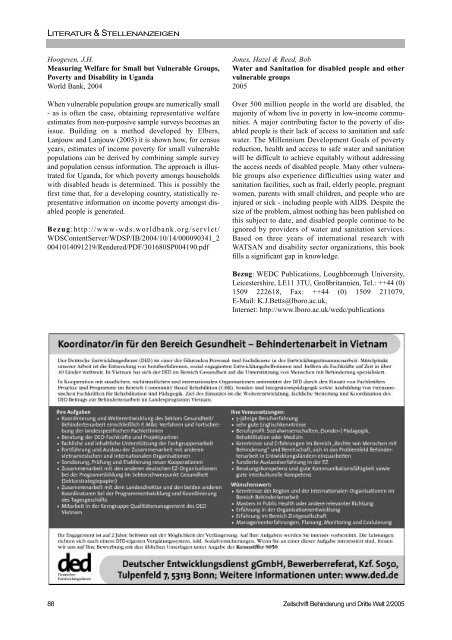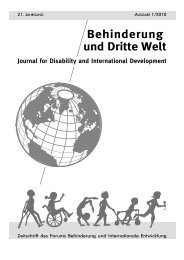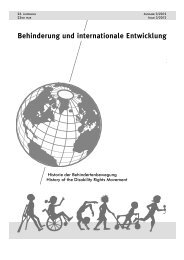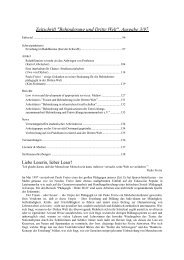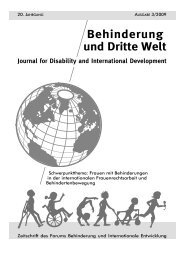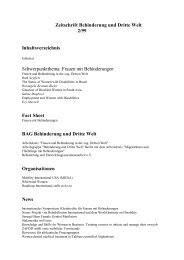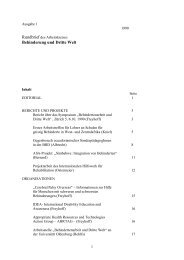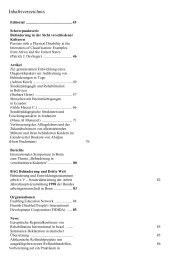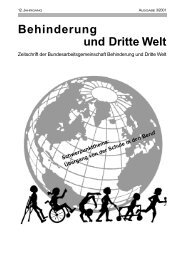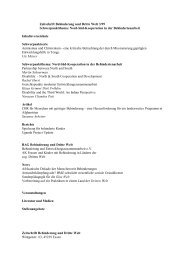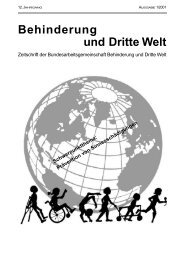Armut und Behinderung - Behinderung und Dritte Welt
Armut und Behinderung - Behinderung und Dritte Welt
Armut und Behinderung - Behinderung und Dritte Welt
You also want an ePaper? Increase the reach of your titles
YUMPU automatically turns print PDFs into web optimized ePapers that Google loves.
LITERATUR & STELLENANZEIGENHoogeven, J.H.Measuring Welfare for Small but Vulnerable Groups,Poverty and Disability in UgandaWorld Bank, 2004When vulnerable population groups are numerically small- as is often the case, obtaining representative welfareestimates from non-purposive sample surveys becomes anissue. Building on a method developed by Elbers,Lanjouw and Lanjouw (2003) it is shown how, for censusyears, estimates of income poverty for small vulnerablepopulations can be derived by combining sample surveyand population census information. The approach is illustratedfor Uganda, for which poverty amongs householdswith disabled heads is determined. This is possibly thefirst time that, for a developing country, statistically representativeinformation on income poverty amongst disabledpeople is generated.Bezug:http://www-wds.worldbank.org/servlet/WDSContentServer/WDSP/IB/2004/10/14/000090341_20041014091219/Rendered/PDF/301680SP004190.pdfJones, Hazel & Reed, BobWater and Sanitation for disabled people and othervulnerable groups2005Over 500 million people in the world are disabled, themajority of whom live in poverty in low-income communities.A major contributing factor to the poverty of disabledpeople is their lack of access to sanitation and safewater. The Millennium Development Goals of povertyreduction, health and access to safe water and sanitationwill be difficult to achieve equitably without addressingthe access needs of disabled people. Many other vulnerablegroups also experience difficulties using water andsanitation facilities, such as frail, elderly people, pregnantwomen, parents with small children, and people who areinjured or sick - including people with AIDS. Despite thesize of the problem, almost nothing has been published onthis subject to date, and disabled people continue to beignored by providers of water and sanitation services.Based on three years of international research withWATSAN and disability sector organizations, this bookfills a significant gap in knowledge.Bezug: WEDC Publications, Loughborough University,Leicestershire, LE11 3TU, Großbritannien, Tel.: ++44 (0)1509 222618, Fax: ++44 (0) 1509 211079,E-Mail: K.J.Betts@lboro.ac.uk,Internet: http://www.lboro.ac.uk/wedc/publications88Zeitschrift <strong>Behinderung</strong> <strong>und</strong> <strong>Dritte</strong> <strong>Welt</strong> 2/2005


